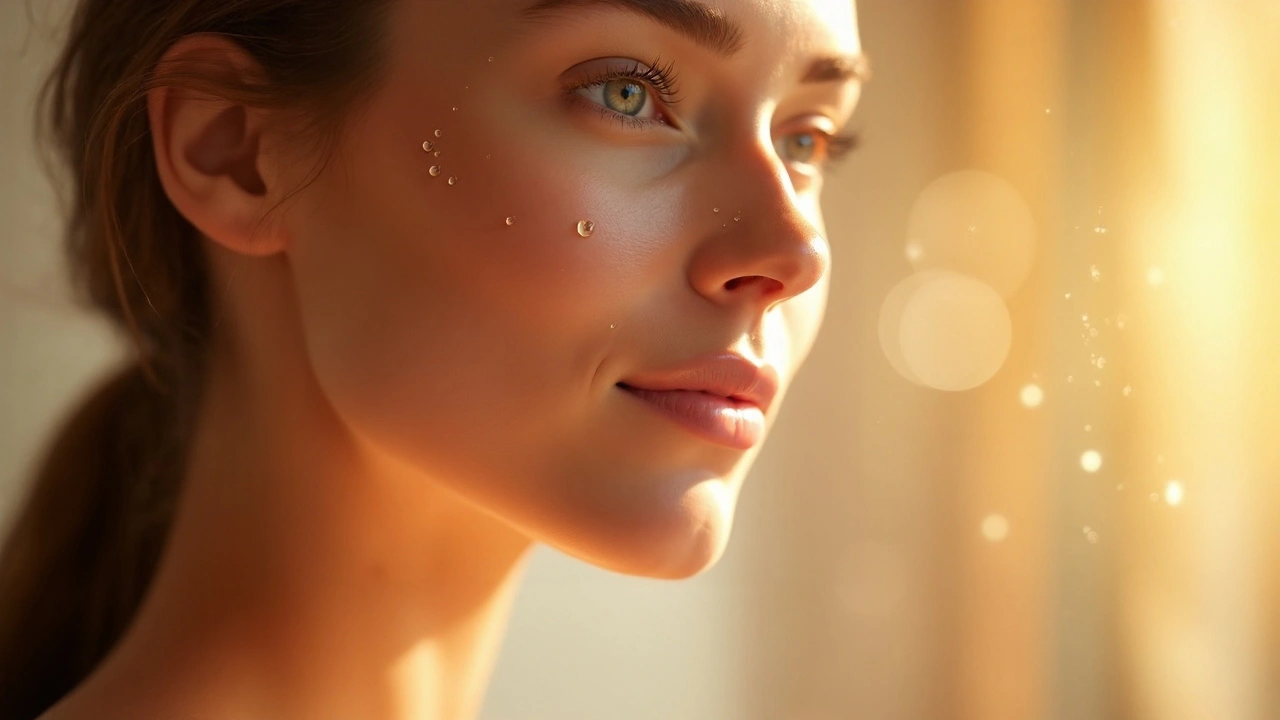
Peptide Skincare Compatibility Quiz
Peptides are short chains of amino acids that act as messengers in the skin, telling cells to boost collagen, reduce inflammation, and tighten the dermal matrix. When formulated correctly, they can out‑perform many classic anti‑aging actives, delivering smoother skin with fewer side effects. Imagine a group of tiny foremen directing construction crews at a building site - that’s what peptides do for your skin’s cellular workforce.
Why the Skin Needs Peptides
As we age, two structural proteins, Collagen the primary protein that gives skin its strength and firmness and Elastin the fiber that provides stretch and recoil, start to degrade. This loss is accelerated by Matrix Metalloproteinases (MMPs) enzymes that break down collagen and elastin. The result? Fine lines, deeper wrinkles, and sagging skin.
Peptides intervene at three key points: they stimulate new collagen production, inhibit MMP activity, and boost the activity of natural Growth Factors proteins that signal cells to divide and repair. By restoring the balance between synthesis and breakdown, peptides keep the skin matrix tight and hydrated.
Top Peptide Families and What They Do
Not all peptides are created equal. Below are the most research‑backed families you’ll see in modern serums and creams.
- Palmitoyl Pentapeptide‑4 also known as Matrixyl, a five‑amino‑acid chain linked to a fatty acidStimulates collagen I & III; reduces MMP‑1 by 30%
- Acetyl Hexapeptide‑8 sometimes called Argireline, mimics the protein SNAP‑25Temporarily relaxes facial muscles; smooths expression lines
- Copper Peptide GHK‑Cu a tripeptide bound to copper ionsPromotes collagen cross‑linking; powerful antioxidant
Each of these molecules targets a slightly different wrinkle‑forming pathway, which is why many formulators blend two or three for a broader effect.
Peptides vs. Classic Anti‑Aging Actives
| Attribute | Peptides | Retinol (Vitamin A) | Hyaluronic Acid |
|---|---|---|---|
| Primary Mechanism | Signal cells to produce collagen & inhibit MMPs | Accelerates cell turnover; boosts collagen indirectly | Locks up to 1000× its weight in water for surface hydration |
| Ideal Skin Type | All types, especially sensitive | Normal to oily; may irritate dry or sensitive skin | Dry, dehydrated, or mature skin |
| Common Side Effects | Minimal; rare mild redness | Peeling, redness, photosensitivity | Usually none; rare pilling if over‑applied |
| Clinical Evidence | Multiple double‑blind studies showing 10‑30% wrinkle depth reduction | Extensive data, but higher irritation rates | Demonstrated 20‑40% improvement in skin moisture |
Peptides offer a gentler route to the same collagen boost that retinol promises, while delivering added MMP inhibition. Pairing them with hyaluronic acid can lock in the newly‑produced matrix for an instant plump.
How to Layer Peptides with Other Actives
Because peptides are stable at a wide pH range, they play nicely with most ingredients. Here’s a quick stacking guide:
- Cleanse with a low‑pH gel (pH 5‑6) to keep the skin barrier intact.
- Apply water‑based serums containing Vitamin C (ascorbic acid) - wait 2‑3 minutes for absorption.
- Follow with a peptide serum (5‑10% active concentration). The peptide molecules will sink into the epidermis before the barrier reseals.
- Seal the routine with a moisturizer containing Hyaluronic Acid a humectant that retains moisture in the upper layers.
- At night, you can add a retinol product after the peptide serum if your skin tolerates it, but keep the retinol concentration low (0.1‑0.3%).
Notice how the peptide step never sits directly under an acidic exfoliant (like high‑strength AHA) - that can degrade some peptide bonds.

Usage Tips, Dosage, and Formulation Details
Effective peptide products usually contain 2‑10% peptide concentration. Anything lower may not reach the dermal layer, while higher percentages can lead to increased viscosity without added benefit.
- Frequency: Start with once daily in the evening, then move to twice daily after two weeks if no irritation.
- Application area: Focus on crow’s feet, nasolabial folds, and any fine‑line prone zones.
- Storage: Keep products in a cool, dark place. Peptides are heat‑sensitive; avoid temperatures above 30°C.
- Packaging: Air‑less pumps or opaque tubes preserve peptide integrity longer than jars.
In clinical trials, participants using a 5% Matrixyl serum for 12weeks saw an average 15% reduction in wrinkle depth, while those applying it twice daily experienced a 22% improvement.
Safety Profile and Clinical Evidence
Regulatory bodies classify cosmetic peptides as “inactive” ingredients, meaning they don’t require extensive FDA review. Nonetheless, dozens of peer‑reviewed studies confirm their safety:
- Palmitoyl Pentapeptide‑4 has a No‑Observed‑Adverse‑Effect Level (NOAEL) of 500mg/kg in animal models
- Acetyl Hexapeptide‑8 showed no irritation in a 28‑day repeat insult patch test on 30 volunteers
- Copper Peptide GHK‑Cu demonstrated wound‑healing acceleration without systemic copper toxicity
Reported side effects are limited to temporary tingling or mild erythema, which usually resolves within 24hours. People with copper‑sensitivity should avoid copper peptides; otherwise, the risk profile is comparable to that of moisturizers.
Future Directions: Bio‑engineered and Personalized Peptides
Researchers are now using recombinant DNA technology to create “designer peptides” that target specific skin‑aging genes. Early‑stage trials of a peptide that silences theAP‑1 transcription factor (a key driver of MMP expression) have shown a 40% drop in collagen degradation after eight weeks.
Another hot trend is nano‑carrier systems - lipid‑based vesicles that ferry peptides deeper into the dermis. These carriers can boost peptide penetration by up to 3‑fold, meaning lower concentrations achieve the same results.
Finally, AI‑driven skin analysis apps are beginning to recommend personalized peptide blends based on individual collagen loss patterns, age, and lifestyle factors. Expect to see “custom peptide serums” on the market within the next two years.
Putting It All Together: A Sample Daily Regimen
- Morning cleanse with a gentle pH‑balanced gel.
- Apply a vitamin C serum (15% L‑ascorbic acid).
- Layer a peptide serum containing Palmitoyl Pentapeptide‑4 (5%).
- Finish with a moisturizer enriched with Hyaluronic Acid (1%).
- Apply broad‑spectrum SPF 30+.
- Evening: cleanse, then use a low‑dose Retinol (0.2%).
- Follow with the same peptide serum (or a night‑only peptide cream with added Copper Peptide).
- Seal with a richer night cream containing ceramides.
This routine balances collagen stimulation, surface hydration, and cell turnover while minimizing irritation - the perfect recipe for wrinkle prevention and long‑term skin rejuvenation.
Frequently Asked Questions
Can I use peptides if I have sensitive skin?
Yes. Peptides are among the gentlest anti‑aging actives. Most studies report only mild tingling or brief redness, which usually subsides within a day. Start with a low‑concentration serum (2‑3%) and patch test on the jawline before full‑face use.
Do peptides work better than retinol?
Peptides and retinol target different pathways. Retinol accelerates cell turnover, while peptides signal collagen synthesis and block MMPs. For most users, a combination offers the best results - peptides provide a steady, irritation‑free boost, and retinol adds extra renewal.
How long does it take to see results from peptide serums?
Visible improvements typically appear after 8‑12weeks of consistent twice‑daily use. Clinical trials report a 10‑20% reduction in wrinkle depth within three months, with progressive gains up to six months.
Are peptide products stable in everyday packaging?
Stability depends on formulation. Air‑less pumps, opaque bottles, and cool storage preserve peptide bonds. Avoid exposing peptide creams to direct sunlight or leaving them in a hot bathroom, as heat can denature the molecules.
Can I layer peptides with other active acids like glycolic acid?
Yes, but timing matters. Apply glycolic acid first, wait a few minutes for the pH to normalize, then follow with the peptide serum. This prevents premature peptide degradation and still lets the acid exfoliate effectively.
15 Comments
Hobert Finn Bodfish
September 24, 2025 AT 06:33 AM
Peptides? Please. Retinol’s been the gold standard for 20 years. This is just skincare marketing BS wrapped in fancy biojargon.
You think a 5-amino-acid chain is gonna outperform retinoic acid? Wake up. The only thing peptides do is make you spend $120 on a bottle that’s 95% water.
Also, copper peptides? You’re gonna let metal ions into your skin? That’s how you get oxidative stress.
LOL
Andrea Galetto
September 24, 2025 AT 18:27 PM
Peptides are for people who can’t handle real science. Retinol is proven. Vitamin C is proven. Hyaluronic acid is a glorified moisturizer. Peptides? A placebo with a lab coat.
And don’t even get me started on ‘bioengineered designer peptides’ - that’s not skincare, that’s sci-fi.
Stop wasting your money.
Real skin care is simplicity.
And sunscreen.
Always sunscreen.
Daniel Rogers
September 25, 2025 AT 15:32 PM
YESSSS this is the real deal 🙌
I was skeptical too but after 8 weeks my skin just looks… lit? Like it’s glowing from within. No more dullness.
Pair it with vitamin C in the AM and retinol at night - total game changer.
Also, airless pump? Non-negotiable. My last serum went bad in 3 weeks because I used a jar. 🤦♂️
PS: I’m 39 and my friends keep asking if I’m on a new skincare regimen. I just smile and say ‘peptides’ 😎
Chris Remo
September 26, 2025 AT 11:25 AM
Just want to say - peptides are lowkey magic.
I have super sensitive skin and retinol used to wreck me. Peptides? Zero drama.
My fine lines didn’t vanish overnight, but slowly, like a good wine, they faded.
Also, storage matters. I keep mine in the fridge now. Feels nice in the morning too.
And yeah, the price is steep, but a little goes a long way.
Worth every penny if you’re tired of your skin looking like a dried apple.
Michael Herr
September 26, 2025 AT 22:08 PM
I’ve been using GHK-Cu for six months. My skin tone is more even. My scars from acne are lighter. No tingling. No peeling. Just better skin.
Don’t overcomplicate it. Cleanse. Apply. Moisturize. Repeat.
Science isn’t flashy. It’s consistent.
Crystal Magnant
September 27, 2025 AT 11:28 AM
Peptides are fine I guess. But have you seen what’s in the base formula? Parabens. Silicones. Fragrance.
It’s not the peptide that’s doing the work - it’s the filler that’s making your skin feel smooth.
Real skincare doesn’t need 12 ingredients.
Just water. Oil. And patience.
And maybe a little sun avoidance.
Also, I don’t trust anything labeled ‘bioengineered’.
It sounds like a lab experiment gone wrong.
Danie Joy
September 28, 2025 AT 07:15 AM
Peptides are a distraction from the real issue - EMF radiation from phones and Wi-Fi is breaking down collagen faster than MMPs ever could.
They don’t want you to know this. Big Skincare is selling you peptides so you forget about the real enemy.
Also, copper peptides? Copper is used in 5G towers. Coincidence? I think not.
Wear silver foil hats at night. Your skin will thank you.
And stop using smartphones. Use a landline.
It’s the only way.
Katherine Stapp
September 29, 2025 AT 00:12 AM
Peptides? That’s a western scam. In India, we’ve been using turmeric and rosewater for 5000 years. Why are we chasing some lab-made molecule?
My grandmother never heard of Matrixyl. Her skin was better than mine at 70.
Stop buying into corporate lies.
Go back to nature.
And stop paying $80 for a 30ml bottle of water with a fancy name.
It’s all a scam. I know. I’ve seen the documents.
Frank De Silva
September 29, 2025 AT 00:42 AM
Interesting. But I’ve read the original papers. The clinical trials are underpowered. Small sample sizes. Industry-funded.
And the ‘22% wrinkle reduction’? That’s relative to baseline - not absolute.
Also, why is no one talking about the placebo effect in skincare? People think they look better because they spent money.
It’s not the peptide. It’s the ritual.
And the lighting.
And the filter.
And the fact that they stopped drinking soda.
Peptides are the least important variable here.
KJ Miller
September 29, 2025 AT 06:08 AM
Just wanted to say thank you for this breakdown. I’ve been overwhelmed by skincare for years.
This is the first time I’ve understood what’s actually happening in my skin.
And honestly? I feel hopeful.
Not because I’m chasing youth - but because I’m learning to care for my skin like it’s a living thing.
Peptides aren’t magic. But they’re a tool.
And tools are good when you know how to use them.
Keep sharing this stuff. It matters.
Claire Battista
September 29, 2025 AT 20:18 PM
I appreciate the science here. But please don’t make people feel like they need to follow this exact routine.
Some of us have limited budgets. Some of us have sensitive skin. Some of us just need to wash our face and sleep.
You don’t need 7 steps to have healthy skin.
Consistency > complexity.
And kindness to yourself matters more than any peptide.
Erin DeGroot
September 29, 2025 AT 23:53 PM
I’ve been using a 5% Matrixyl serum for four months now. I didn’t expect much, but my skin has changed subtly - not in a dramatic way, but in a quiet, lasting way.
The texture is smoother. The fine lines around my eyes are less deep.
I don’t look younger. I look more rested.
And that’s enough.
Thank you for writing this clearly. It’s rare to find skincare advice that doesn’t sound like an infomercial.
Stephanie Bryant
September 30, 2025 AT 17:29 PM
OMG I just realized I’ve been storing my peptide serum in my bathroom next to the shower 😳
That’s why it stopped working after 2 months! I thought I was just bad at skincare.
Now I keep it in the fridge and my skin is glowing again.
Also, I mixed it with my moisturizer and it pilled like crazy - now I apply it alone. Life changed.
PS: typo in my last comment lol I meant ‘glowing’ not ‘glwoing’
Drashti patel
October 1, 2025 AT 06:41 AM
Peptides are not new. In Ayurveda, we use herbal extracts that stimulate collagen naturally - like ashwagandha and shatavari. They work slower but without side effects.
Western science is just catching up.
Also, why are we treating skin like a machine? It’s not a circuit board. It’s a living system.
Stress, sleep, and diet matter more than any serum.
But still - peptides? Fine. I’ll try them.
Just don’t call them ‘magic’.





Chloe McDonald
September 23, 2025 AT 19:04 PM
Been using Matrixyl for 3 months and my crow’s feet are way less noticeable. No redness, no peeling, just smoother skin. I’m sold.
Also, my mom asked if I got a facial. Lol.